30-Day Study Plan: Economics Class 12 | Economics Class 12 - Commerce PDF Download
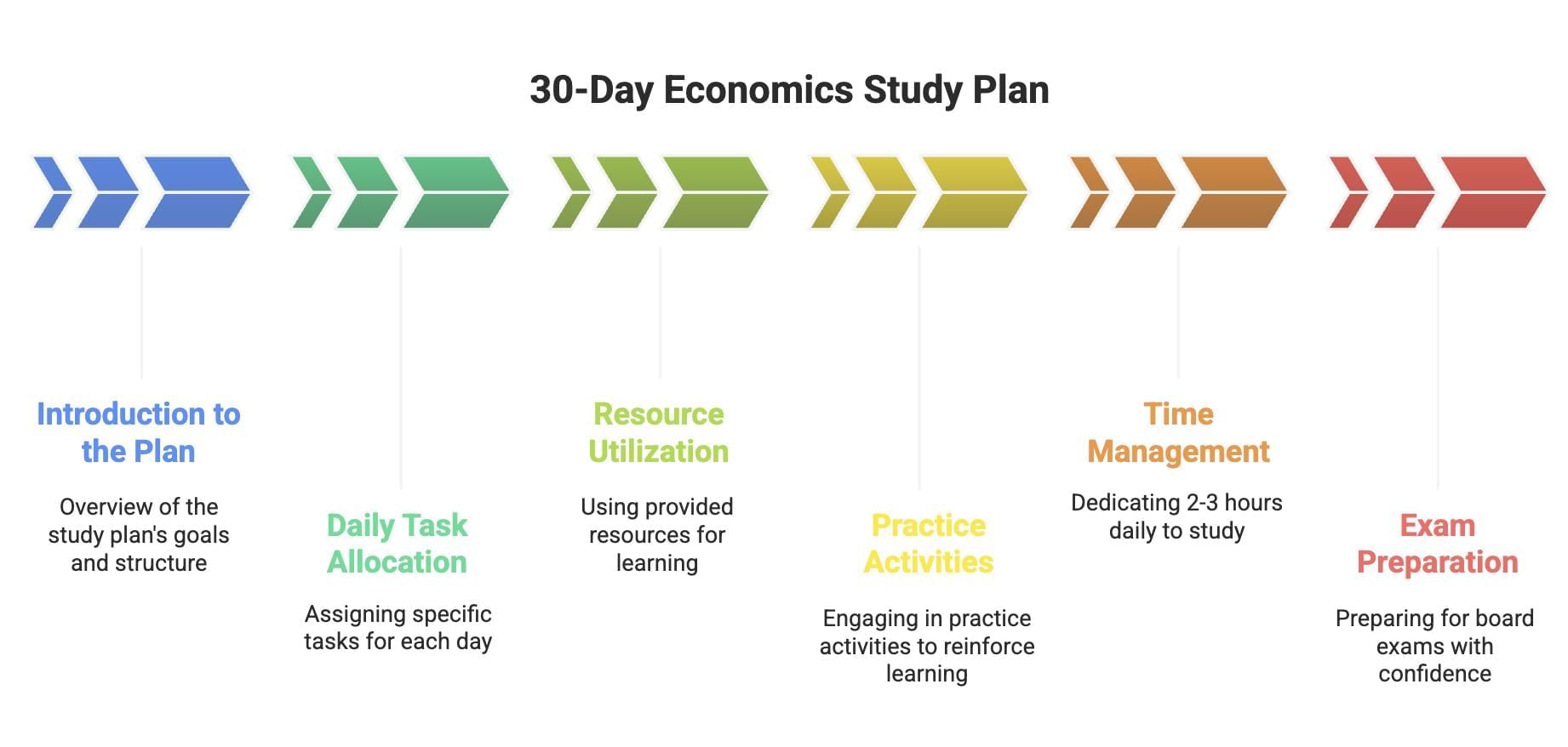
Week 1: Foundations of Indian Economic Development
Day 1: Indian Economy on the Eve of Independence
Understand the economic conditions of India under colonial rule, focusing on agriculture, industry, and trade.
- Read: Chapter Notes - Indian Economy on the Eve of Independence
- Watch: Indian Economy on the Eve of Independence
- Task: Create a mind map summarizing colonial economic impacts.
- Practice: Attempt Test: Indian Economy On The Eve Of Independence - 1
Day 2: Indian Economy on the Eve of Independence (Continued)
Deepen understanding of the agricultural and industrial sectors under colonial rule.
- Watch: Impact on Agricultural Sector and Impact on Industrial Sector
- Read: NCERT Textbook: Indian Economy on the Eve of Independence
- Task: Write a short note on the economic impacts of colonial rule.
- Practice: Solve Worksheet: Indian Economy On The Eve of Independence - 1
Day 3: Indian Economy 1950-1990
Explore the economic policies and planning in India post-independence.
- Read: Chapter Notes - Indian Economy 1950-1990
- Watch: Fun Video: Economic System and its Types
- Task: Summarize the goals of five-year plans in your own words.
- Practice: Attempt Test: Indian Economy - 1
Day 4: Indian Economy 1950-1990 (Continued)
Study the agricultural and industrial policies, including import substitution.
- Watch: Agriculture and Industrial Sector and Trade Policy: Import Substitution
- Read: NCERT Textbook: Indian Economy (1950-1990)
- Task: Create a table comparing agricultural and industrial policies.
- Practice: Solve Worksheet: Indian Economy 1950-1990 - 1
Day 5: Liberalisation, Privatisation, and Globalisation (LPG)
Understand the New Economic Policy of 1991 and its components.
- Read: Chapter Notes - Liberalization, Privatisation and Globalisation
- Watch: Introduction of Liberalisation, Privatisation and Globalisation
- Task: Write a short note on the objectives of LPG reforms.
- Practice: Attempt Test: Liberalisation, Privatisation And Globalisation
Day 6: LPG Reforms (Continued)
Explore the industrial policy and impacts of LPG reforms.
- Watch: Background: New Economic Policy of LPG and Liberalisation and its Industrial Policy
- Read: NCERT Textbook: Liberalisation, Privatisation & Globalisation
- Task: Create flashcards for key LPG terms.
- Practice: Solve Worksheet: Liberalisation, Privatisation and Globalisation - 1
Day 7: Revision and Practice Test
Revise concepts from Days 1-6 and assess your understanding.
- Review: Mindmap: Indian Economy on the Eve of Independence and Mindmap: Indian Economy 1950-1990
- Task: Revise notes and focus on weak areas.
- Practice: Attempt Test: Development Experience (1947-90) and Economic Reforms since 1991
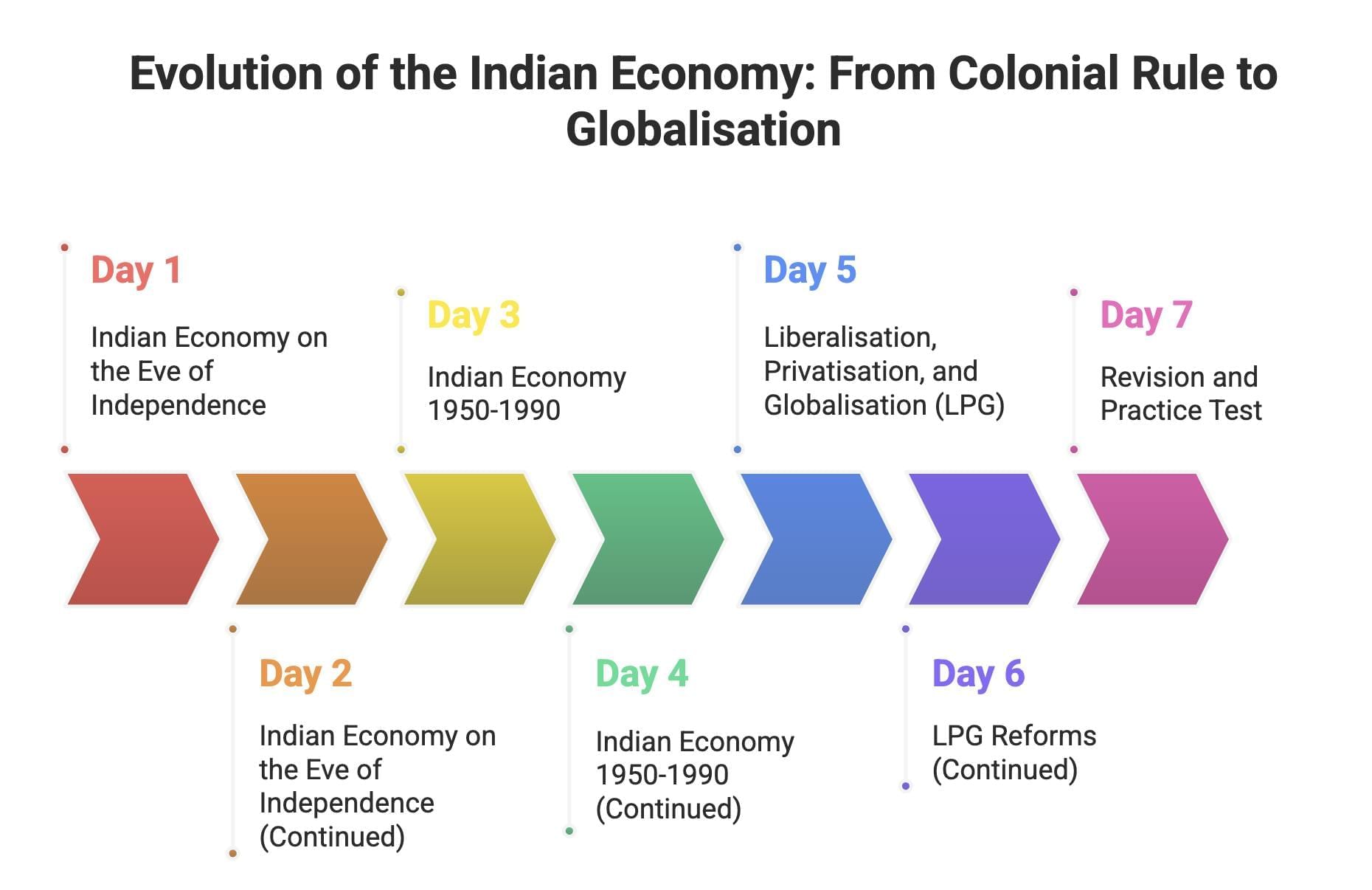
Week 2: Indian Economic Development (Continued)
Day 8: Human Capital Formation
Learn about human capital, its role, and challenges in India.
- Read: Chapter Notes - Human Capital Formation in India
- Watch: What is Human Capital?
- Task: Summarize the importance of human capital formation.
- Practice: Attempt Test: Human Capital Formation In India - 1
Day 9: Human Capital Formation (Continued)
Study the role of education and economic growth in human capital formation.
- Watch: Education for All and Human Capital and Economic Growth
- Read: NCERT Textbook: Human Capital Formation in India
- Task: Create a table comparing human and physical capital.
- Practice: Solve Worksheet: Human Capital Formation in India - 1
Day 10: Rural Development
Understand the meaning and processes of rural development.
- Read: Chapter Notes - Rural Development
- Watch: Meaning of Rural Development
- Task: Write a note on rural credit needs.
- Practice: Attempt Test: Rural Development - 1
Day 11: Rural Development (Continued)
Explore rural credit and agricultural marketing systems.
- Watch: Rural Credit and Needs for Rural Credit and Agricultural Marketing System
- Read: NCERT Textbook: Rural Development
- Task: List key rural development programs.
- Practice: Solve Worksheet: Rural Development - 2
Day 12: Employment: Growth, Informalisation, and Other Issues
Study employment trends and the informal sector in India.
- Read: Chapter Notes - Employment: Growth, Informalisation & other Issues
- Watch: Introduction: Employment
- Task: Create a mind map of employment sectors.
- Practice: Attempt Test: Employment Growth And Other Issues - 1
Day 13: Employment (Continued)
Analyse the sectors of the Indian economy and employment challenges.
- Watch: Sectors of Indian Economy
- Read: NCERT Textbook: Employment
- Task: Write a note on the informalisation of employment.
- Practice: Solve Worksheet: Employment - 1
Day 14: Revision and Practice Test
Revise concepts from Days 8-13 and take a practice test.
- Review: Mind Map: Human Capital Formation and Mind Map: Rural Development
- Task: Revise notes and focus on weak areas.
- Practice: Attempt Test: Current Challenges Facing Indian Economy
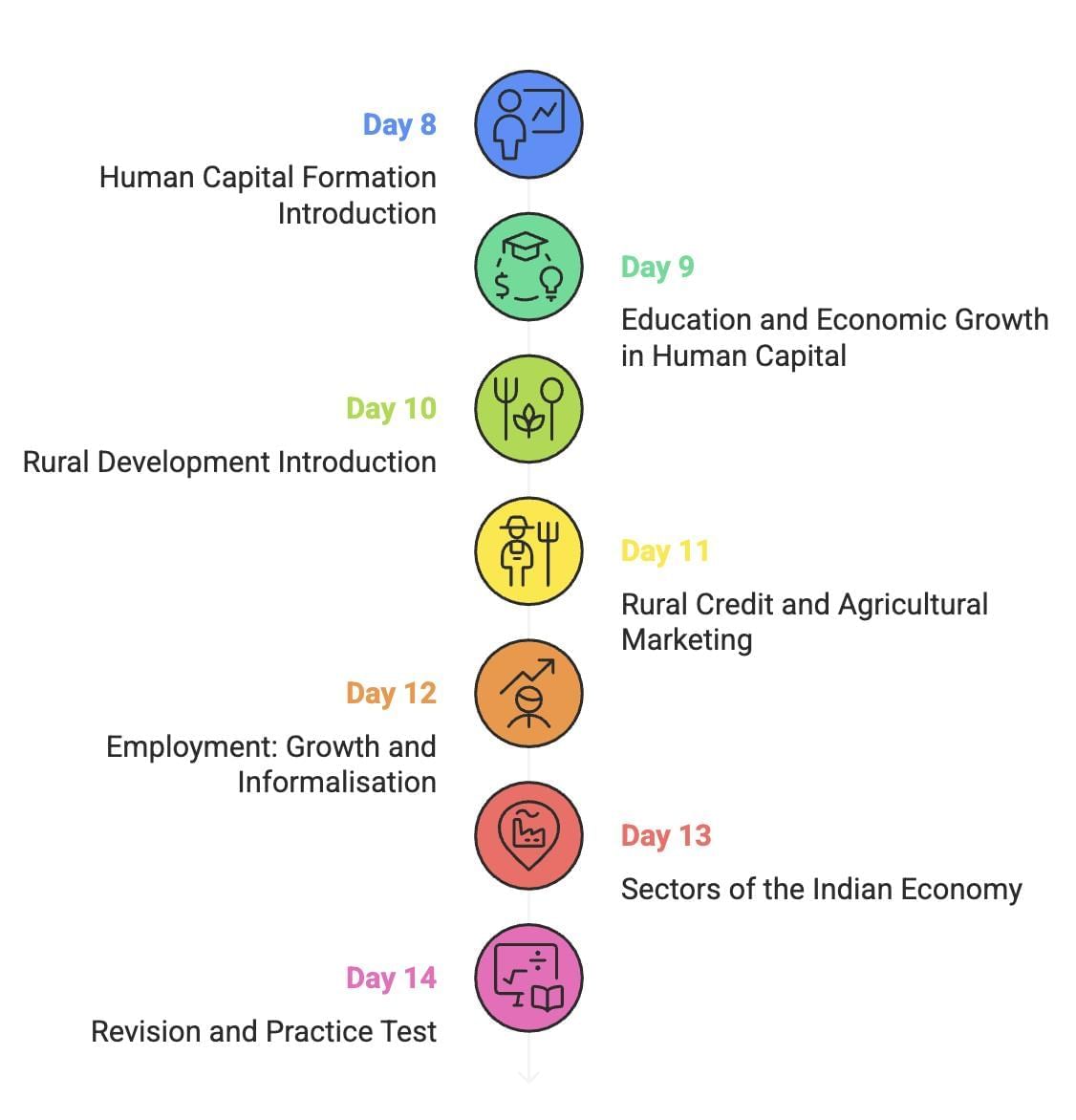
Week 3: Indian Economic Development and Introduction to Macroeconomics
Day 15: Environment and Sustainable Development
Learn about environmental challenges and sustainable development strategies.
- Read: Chapter Notes - Environment & Sustainable Development
- Watch: Environment & Sustainable Development
- Task: Summarise key environmental issues in India.
- Practice: Attempt Test: Environment And Sustainable Development - 1
Day 16: Comparative Development Experiences
Study the development experiences of India, China, and Pakistan.
- Read: Chapter Notes - Comparative Development Experiences
- Watch: History of Revolution of China
- Task: Create a table comparing demographic indicators of India, China, and Pakistan.
- Practice: Attempt Test: Development Experience Of India - 1
Day 17: Introduction to Macroeconomics
Understand the scope and basic concepts of macroeconomics.
- Read: Chapter Notes: Introduction to Macroeconomics
- Watch: Macroeconomics
- Task: Create flashcards for macroeconomic terms.
- Practice: Attempt Test: Introduction To Macroeconomics - 1
Day 18: National Income Accounting
Learn methods to calculate national income and related aggregates.
- Read: Chapter Notes – National Income Accounting
- Watch: Some Basic Concepts of Macroeconomics
- Task: Solve numerical problems on income method.
- Practice: Attempt Test: National Income Accounting - 1
Day 19: National Income Accounting (Continued)
Study expenditure and value-added methods for national income.
- Watch: Expenditure Method and Product or Value Added Method
- Read: NCERT Textbook: National Income Accounting
- Task: Create a table comparing GDP and GNP.
- Practice: Solve Worksheet: National Income Accounting - 1
Day 20: Money and Banking
Understand the functions of money and the role of the banking system.
- Read: Chapter Notes - Money & Banking
- Watch: Functions of Money and Role of Money
- Task: Summarise the role of the Reserve Bank of India.
- Practice: Attempt Test: Money And Banking - 1
Day 21: Revision and Practice Test
Revise concepts from Days 15-20 and take a practice test.
- Review: Mind Map: Environment and Sustainable Development and Mind Map: National Income Accounting
- Task: Revise notes and focus on weak areas.
- Practice: Attempt Test: Development Experience of India
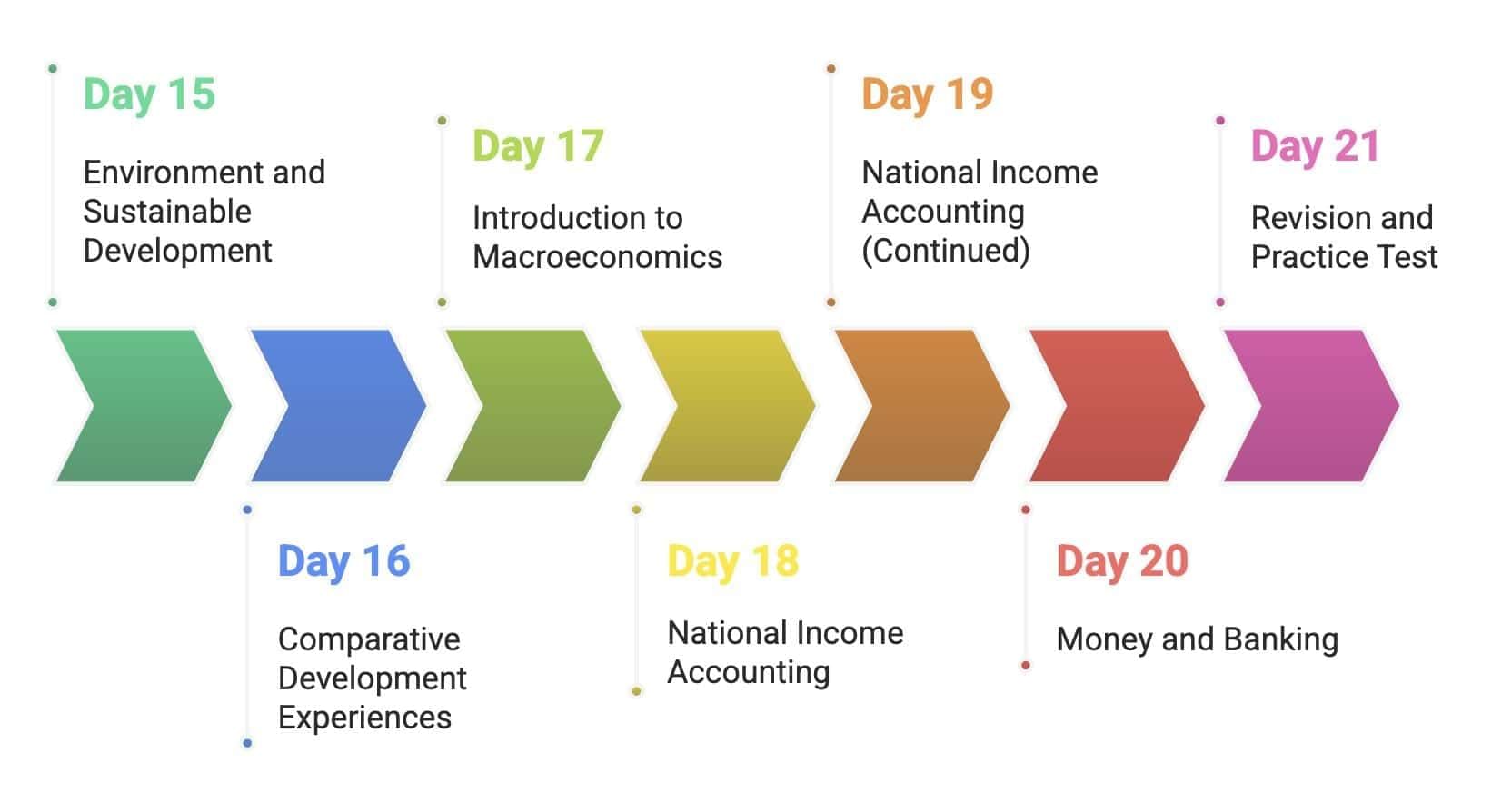
Week 4: Macroeconomics (Continued)
Day 22: Money and Banking (Continued)
Explore money creation and monetary policy instruments.
- Watch: Money Creation by Banking System and Instruments of Monetary Policy and RBI
- Read: NCERT Textbook: Money & Banking
- Task: Explain the concept of reserve ratio.
- Practice: Solve Worksheet: Money and Banking - 1
Day 23: Determination of Income and Employment
Study aggregate demand, aggregate supply, and the multiplier effect.
- Read: Chapter Notes - Determination of Income and Employment
- Watch: What is Aggregate Demand? and The Multiplier Effect, MPC, and MPS
- Task: Solve numerical problems on the multiplier effect.
- Practice: Attempt Test: Income Determination - 1
Day 24: Government Budget and the Economy
Understand the components of the government budget and fiscal policy.
- Read: Chapter Notes - Government Budget and the Economy
- Watch: Fun Video: All about Fiscal Policy
- Task: Create a table of revenue and capital expenditure.
- Practice: Attempt Test: Government Budget And Economy - 1
Day 25: Open Economy Macroeconomics
Learn about balance of payments and foreign exchange markets.
- Read: Chapter Notes - Open Economy Macroeconomics
- Watch: Balance of Payment and Balance of Trade
- Task: Explain fixed vs. floating exchange rates.
- Practice: Attempt Test: Open Economy Macroeconomics - 1
Day 26: Open Economy Macroeconomics (Continued)
Study determinants of exchange rates and equilibrium output.
- Watch: Determinants of Exchange Rate and Equilibrium Output
- Read: NCERT Textbook: Open Economy Macroeconomics
- Task: Solve numerical problems on balance of payments.
- Practice: Solve Worksheet: Open Economy Macroeconomics - 1
Day 27: Revision of Macroeconomics
Revise macroeconomic concepts from Days 17-26.
- Review: Mind Map: Determination of Income and Employment and Mind Map: Open Economy
- Task: Summarise key macroeconomic concepts.
- Practice: Attempt Value-Based Questions - Macroeconomics
Day 28: Previous Year Papers
Practice with previous year CBSE Economics papers to understand the exam pattern.
- Solve: Class 12 Economics Question Paper Solved (2024) - 1
- Solve: Class 12 Economics Question Paper Solved (2023) - 1
- Task: Analyse mistakes and review related concepts.
Day 29: Sample Papers
Solve CBSE sample papers to simulate exam conditions.
- Solve: Class 12 Economics: CBSE Sample Question Papers (2024-25)
- Solve: Class 12 Economics Official Sample Question Paper (2023-24)
- Task: Time yourself to improve speed and accuracy.
Day 30: Final Revision and Mock Test
Revise all topics, focus on weak areas, and take a final mock test.
- Review: Syllabus: Economics for Class 12
- Task: Revise all mind maps and notes.
- Practice: Attempt Class 12 Economics Question Paper Solved (2024)
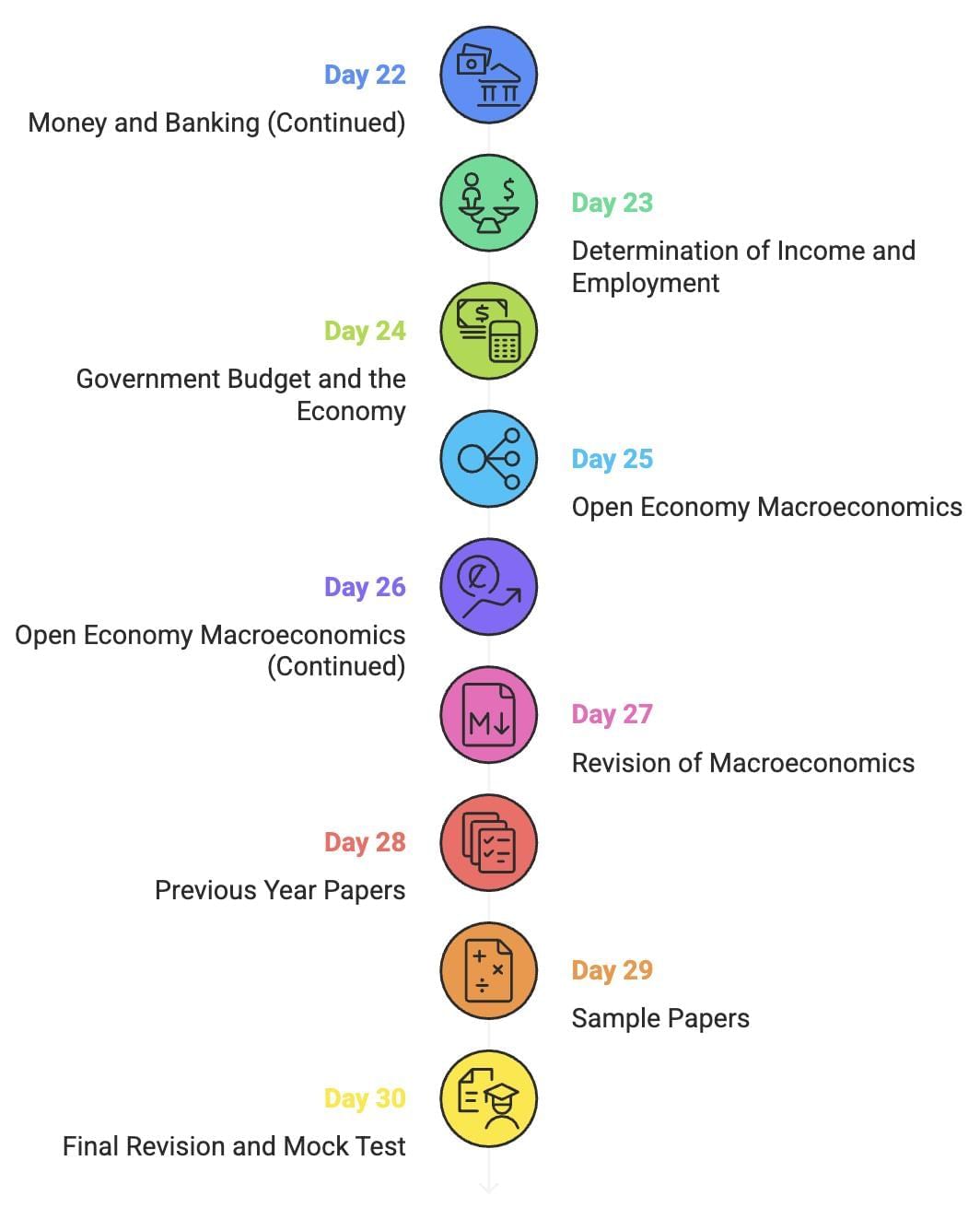
Tips for Effective Preparation
- Stay Consistent: Dedicate 2-3 hours daily and follow the schedule diligently.
- Use Visual Aids: Study with the help of mind maps, tables, and flashcards to reinforce concepts like national income methods and LPG reforms.
- Practice Regularly: Solve worksheets, tests, and past papers to build confidence and improve problem-solving skills.
- Revise Actively: Summarise concepts in your own words and teach them to a peer to enhance retention.
- Stay Positive: Take short breaks, stay motivated, and maintain a positive mindset to avoid burnout.
|
64 videos|381 docs|57 tests
|
FAQs on 30-Day Study Plan: Economics Class 12 - Economics Class 12 - Commerce
| 1. What are the key elements of Indian Economic Development discussed in the course? |  |
| 2. How does macroeconomics relate to Indian Economic Development? |  |
| 3. What are some effective study tips for preparing for the economics exam? |  |
| 4. What are the main topics covered in the Macroeconomics section of the course? |  |
| 5. How can students effectively prepare for the exam within a 30-day study plan? |  |
















